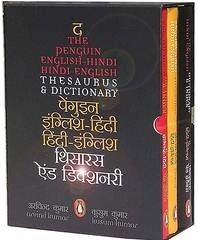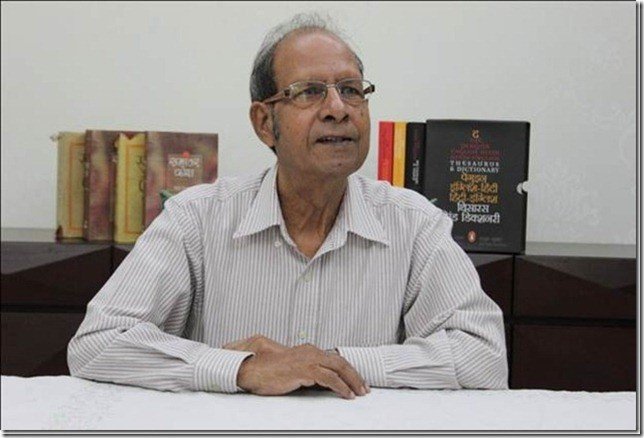Arvind Kumar with two editions of the legendary Samantar Kosh and The Penguin English-Hindi/Hindi-English Thesaurus and Dictionary
You can view Arvind Kumar’s Image gallery here or read Wonderful Wordsmith–Recent Reader’s Digest Article on Arvind Kumar
b. 1930
M.A. in English Literature
Currently independent lexicographer
Formerly editor of
- the Hindi Magazine Madhuri (a Times of India publication) (1963-1978) and
- Sarvottam (Hindi edition of the Reader’s Digest) (1980-1985).
- Before 1963, Arvind was with the Delhi Press group of publications as the executive assistant editor in charge of all their magazines at that time, i.e.., Sarita (Hindi), Sarita (Urdu), Mukta (Hindi) and Caravan (English).
The Arvind Lexicon Database
Arvind Kumar’s vision became his mission in life and gave us Arvind Lexicon … the largest repository of English and Hindi expressions in the world.
After 36 long years of hard work and dedication, Arvind’s pursuit continues … he is expanding his Work to create a gigantic World Bank of Words. He hopes to add all major Indian languages and international languages to his vast data creating multi-lingual thesauruses.
“There are great possibilities,” he says, “As long as languages continue to expand and enrich themselves, my work cannot end.”
Today, the Arvind Lexicon database comprises about one million expressions ~ 520,000 in Hindi and 430,000 in English. Arvind Lexicon seamlessly integrates the functionality of a dictionary and a thesaurus. For any given word, it offers synonyms and antonyms as well as related and opposite concepts.
Click here to read more about this amazing story of dedication and persistence.
Lexicographic Works
Samantar Kosh — Hindi Thesaurus
The first and exhaustive thesaurus in any modern Indian language, it covers almost all the subjects which a modern international English thesaurus does. Its 1,768 pages in two volumes, offer 160,850 synonyms or expressions under 1,100 classifications subdivided into 23,759 subclasses fully indexed. The totally original plan leads a reader very naturally from one concept to another, both on the basis of similarities and dissimilarities. Like most Indian languages, Hindi has many more synonyms than the European languages. Samantar Kosh has been hailed as ‘the Pride of India’, as the ‘Finest Achievement of Independent India’ and also as a ‘Landmark in Hindi’s Progress towards Modernization’ and also as ‘A Golden Auspicious Mark on Hindi’s Forehead’.
The Samantar Kosh is a selection of some 1,68,000+ expressions from the structured database of 900,000+ records in a priprietory data base.
Arvind Sahaj Samantar Kosh
India’s first alphabetical thesaurus. Based on a replenished database. Includes a large number of modern Hindi usages. It contains about 79,000 unque expressions, provides cross links to associated words groups (for example, Artihmatic offers Algebra, Geometry and Mathemantics as associations), leads to a number of opposite (antonynmous) word groups too. A convenient linguistic resource.
Shabdeshwari
A unique thesaurus of Hindu mythological names–first-ever in any language. The tradition of Nighantu (the ancient Sanskrit collection of Vedic words) flowered into the famed works like Vishnu Sahasranam and Shiva Sahasranam. They offered a thousand names of the Hindu gods to whom they were dedicated. Shabdeshwari carries the tradition forward and puts all the deities and gods in one book with a large number of names for each god. For example, it offers 2,411 names for Shiva, 1,676 for Vishnu, 441 for Krishna, 129 for Rama and so on. This can also be outputted into Roman script for the international community interested in Indian history and culture.
The Penguin English-Hindi/Hindi-English Thesaurus and Dictionary
The 3-part Penguin English-Hindi Thesaurus and Dictionary has been designed to serve the needs of all Indians (in the broad sense of all people belonging to the Indian sub-continent or South Asia), living anywhere in the world, who use or want to use either or both of the languages, and all non-Indians who have to do anything with the region, who want to learn either language, increase their vocabulary and diction, and need to communicate in them.
Not only a vast repertory of synonyms and antonyms in both the languages, it is a rich cross-cultural handbook, gives numerous references to help understand and appreciate the sense behind a word truly and deeply. It is a pool of merging ripples of mutually connected concepts/words. In its scope and spread, it leaves any bilingual thesaurus or dictionary miles behind… Its thesaurus part contains 988 headings or word groups, which are subdivided into 25,562 sub-headings or subgroups. Together they contain 5,48,330 expressions of which 2,57,853 are English and 2,90,477 Hindi, with cross-references to similar or opposite concepts (64,529 English and 62,371 Hindi); no other thematic thesaurus has this feature.
Literary Works offered Free Online
Sahaj Geeta or Geeta Made Easy
A Hindi prose translation of the Bhagwad Geeta. The two salient points about this book are:
1. A revolutionary new way of writing Sanskrit text–to make the Shlokas easily accessible to the common man.
2. An easy-to-understand translation in modern Hindi prose–consisting of short and crisp sentences.
You can read this entire work online here.
Vikram Saindhav
A Hindi verse adaptation of Shakespeare’s Julius Caesar. In the ancient Indus Valley is an imaginary republic Saindhav Ganarajya ruled from the capital Dharavati. The patriarch Vikram is challenged by the likes of Kanka and Shatmanyu who claim that by exterminating Vikram they have reestablished democracy for ever. Have they? You can read this entire work online here.
Angreji-Hindi Julius Caesar
The unique book offers Shakespeare’s text on the left and the Hindi verse translation on the right-hand pages. Of great use to the students of English literature. You can read this entire work here.
Faust: Ek Traasadi
A Hindi verse translation of German poet Goethe’s classic play Faust: a Tragedy. Published by the Bharatiya Jnanpith. You can read this entire work here.


Comments